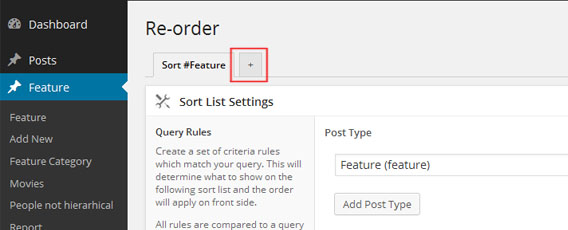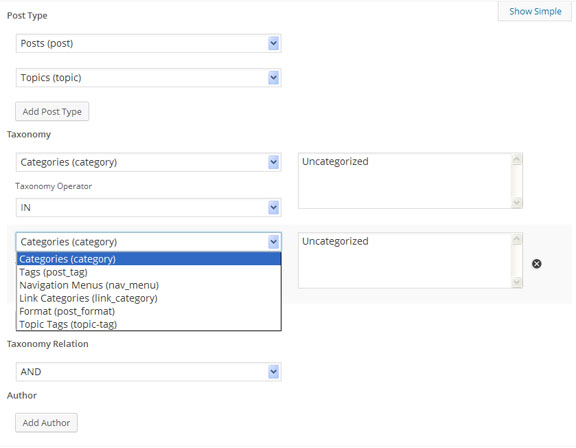Create Advanced Sort for a Custom Post Type – mix of single/multiple post types, taxonomies, meta, authors
The plugin allows to create customized sort lists which will apply for a very specific query, meaning a mix of multiple port types, or/and multiple taxonomies and terms, or/and custom fields – meta, or/and authors etc. Practically this allow to create a sort for controlling any part of your site. A Case Study with additional description can be found at Creating sort for a complex front side theme query
First go to Re-Order interface where the new sort is required to show. Click the + tab which allow to create a new sort:

Click the Show Advanced button located on top right of Sort Settings interface, this will expand the Query Rules section revealing additional options.

The interface allow to specify the custom post types. In case of multiple Add Post Type button can be used to create more. If need taxonomy, Term/Terms can be selected and Taxonomy Operator specified. In case of multiple taxonomies, Add Taxonomy button can be used to create another taxonomy rule.

Save the sort list using Create button.
All post objects which match the sort queries appear on the re-order interface. Using the drag and drop functionality the sort can be customized. In case of using Auto Sort, the order is updated automatically for all query which match this sort, no changes are required to your theme. If Auto Sort is turned off, order can be applied by including the ‘orderby’ => ‘menu_order’ within the query parameters, more details can be found at Sample Usage
Such advanced sort lists, can be used to allow specific users (i.e. editors, or a certain user id, see filters area) to control the sorting for a certain area of website and not everything.


Hi,
I think the following worked in a previous version, but not any more:
we had one sort for a custom post-type. That sort order would propagate down to all taxonomy pages so that the sorting only had to be performed once.
I do not mind to create sorts per taxonomy, as this is a useful and comprehensive function. However: we have in our taxonomy parent-child relations. is there a way set up a sort order to the parent taxonomy that propagate to the child? Now it is rather tedious because we want the order in the parent to be the same as in the child, so now i wil have to create sorts per child i.s.o. doing that on the parent
Hi,
I’am not sure that such thing has been previously working, at least not for v3 plugin series and up. It’s a complex functionality, as will require for the queries to matched not only against similarity but on parent-child relationship. I’ll put this on our list, hopefully our developers will find a way to make that happen.
Thanks